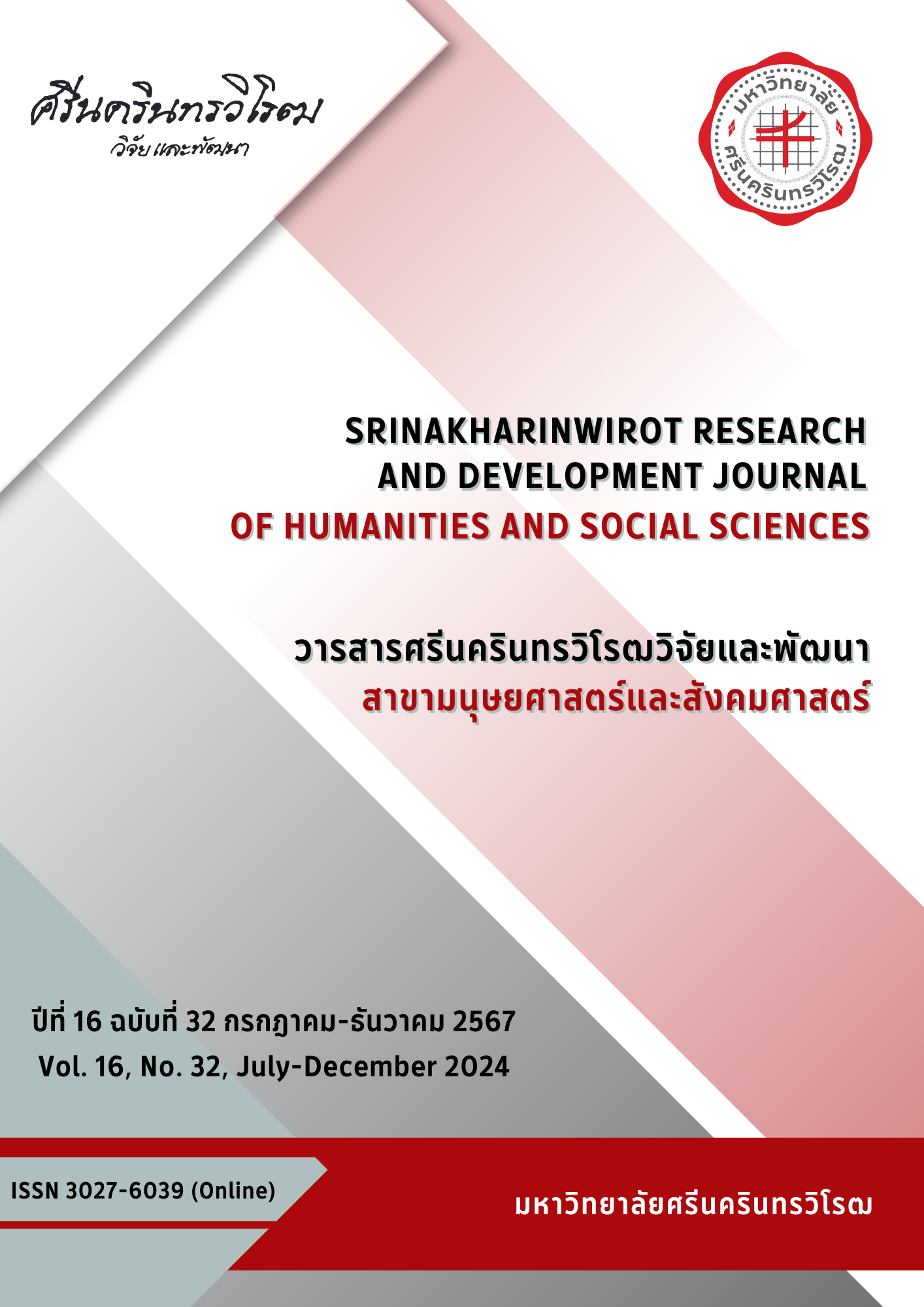EFFECT OF APPLICATION USING FOR HEALTH BEHAVIOR TRACKING ON HEALTH BEHAVIORS, AND HEALTH PSYCHOLOGICAL CAPITAL OF THE WORKING ADULTS AT RISK OF NCDs
Keywords:
Application for Health Behavior Tracking, Health Behaviors, Health Psychological Capital, Noncommunicable Diseases, Working AdultsAbstract
The number of working adults with non-communicable diseases or NCDs are continuously increase. This is an important health issue leading to illness and premature death of working adults. The objectives of this research were to study the effect of application using for health behavior tracking on health behaviors and health psychological capital of the working adults at risk of NCDs. The participants were 41 working adults at risk of NCDs. These participants were assigned to the experimental group and the control group by simple random sampling. The manipulated variable was the application using/no using and the dependent variables were the NCDs-related health behaviors and the NCDs-related health PsyCap. The instruments were the mobile application for health behavior tracking, the NCDs-Health Behaviors Scale (Alpha = .782), and the NCDs-Health PsyCap Scale (Alpha = .897). The Pretest-Posttest Control Group Design was used in this study. The data were analyzed by using mean, standard deviation, and t-test. Result showed that the score of the NCDs-related health behaviors of working adults was increased after using the application at the statistically significant level of .001. The result also found that the difference in pretest and posttest score for the NCDs-related health behaviors of working adults in the experimental group was significantly higher than those in the control group at the statistically significant level of .01. However, no significant difference was found in the score of the NCDs-related health PsyCap between before and after using the application. Furthermore, no significant difference was found between working adults in the experimental group and the control group on the score of difference in pretest and posttest for the NCDs-related health PsyCap. This research revealed the effectiveness of the application only on the NCDs-related health behaviors. This application should be improved in the part of the NCDs-related health PsyCap enhancement before using in the future.
Downloads
References
สำนักงานสถิติแห่งชาติ. (2564). วัยทำงานกับการดูแลสุขภาพ. http://www.nso.go.th/sites/2014/Pages/
สำนักงานสถิติแห่งชาติ. (2564). จำนวนและสัดส่วนประชากรจากการทะเบียน จำแนกตามกลุ่มอายุ (วัยเด็ก วัยแรงงาน วัยสูงอายุ) เพศ ภาค และจังหวัด พ.ศ. 2554 – 2563. http://statbbi.nso.go.th/staticreport/Page/sector/TH/report/sector_01_11103_TH_.xlsx
สำนักงานสถิติแห่งชาติ. (2564). จำนวนประชากรอายุ 15 ปีขึ้นไป จำแนกตามการทำกิจกรรมทางกาย กลุ่มอายุ เพศ เขตการปกครอง และภาค พ.ศ. 2558. http://statbbi.nso.go.th/staticreport/Page/sector/TH/report/sector_05_3_TH_.xlsx
สำนักระบาดวิทยา กรมควบคุมโรค กระทรวงสาธารณสุข. (2557). ระบบเฝ้าระวัง 5 กลุ่มโรค 5 มิติ. บริษัท ฮีซ์ จำกัด.
กองโรคไม่ติดต่อ กรมควบคุมโรค กระทรวงสาธารณสุข. (2563). รายงานสถานการณ์โรค NCDs เบาหวาน ความดันโลหิตสูง และปัจจัยเสี่ยงที่เกี่ยวข้อง พ.ศ. 2562. สำนักพิมพ์อักษรกราฟฟิคแอนด์ดีไซน์.
สำนักโรคไม่ติดต่อ กรมควบคุมโรค กระทรวงสาธารณสุข. (2560). รูปแบบการบริการป้องกันควบคุมโรคเบาหวาน ความดันโลหิตสูง สำหรับสนับสนุนการดำเนินงาน NCD Clinic Plus. โรงพิมพ์ชุมนุมสหกรณ์การเกษตรแห่งประเทศไทย.
จุฬาวรรณ วิสภา. (2563). ผลของโมบายแอปพลิเคชันการควบคุมน้ำหนักต่อพฤติกรรมการบริโภคอาหาร กิจกรรมทางกายและน้ำหนักตัวในวัยรุ่นที่มีภาวะน้ำหนักเกิน [วิทยานิพนธ์ปริญญามหาบัณฑิต ไม่ได้ตีพิมพ์]. มหาวิทยาลัยสงขลานครินทร์.
วิธัญญา วัณโณ. (2564). โปรแกรมเสริมสร้างทุนจิตวิทยาด้านสุขภาพที่เกี่ยวข้องกับกลุ่มโรคไม่ติดต่อเรื้อรัง: การพัฒนาและประเมินผลโปรแกรม และการถ่ายทอดการเรียนรู้จากผู้เข้าร่วมโปรแกรมสู่ครอบครัว. กรุงเทพฯ: คณะมนุษยศาสตร์ มหาวิทยาลัยศรีนครินทรวิโรฒ.
วิธัญญา วัณโณ. (2565). ผลของโปรแกรมเสริมสร้างที่มีต่อทุนจิตวิทยาด้านสุขภาพที่เกี่ยวข้องกับกลุ่มโรคไม่ติดต่อเรื้อรังของนิสิตนักศึกษาระดับปริญญาตรี. วารสารวิชาการสาธารณสุข, 31(supplement 2), s280-s291.
วิธัญญา วัณโณ. (2566). การถ่ายทอดการเรียนรู้ของผู้เข้าร่วมโปรแกรมเสริมสร้างทุนจิตวิทยาด้านสุขภาพที่เกี่ยวข้องกับกลุ่มโรคไม่ติดต่อเรื้อรังสู่ครอบครัว: การวิเคราะห์ข้อมูลระดับบุคคลและระดับครอบครัว. วารสารวิธีวิทยาการวิจัย, 36(1), 47-62.
นงลักษณ์ วิรัชชัย. (2555). วิธีการที่ถูกต้องและทันสมัยในการกำหนดขนาดตัวอย่าง. ใน เอกสารประกอบการบรรยายเรื่องวิธีการที่ถูกต้องและทันสมัยในการกำหนดขนาดตัวอย่าง. หน้า 1-20. กรุงเทพฯ: สำนักงานคณะกรรมการวิจัยแห่งชาติ.
Hair, J. F., Black, W. C., Babin, B. J., and Anderson, R. E. (2014). Multivariate data analysis (new international edition). Essex, UK: Pearson Education Limited.
ศิริชัย กาญจนวาสี. (2552). ทฤษฎีการทดสอบแบบดั้งเดิม (พิมพ์ครั้งที่ 6). กรุงเทพฯ: คณะครุศาสตร์ จุฬาลงกรณ์มหาวิทยาลัย.
กองสุขศึกษา กรมสนับสนุนบริการสุขภาพ กระทรวงสาธารณสุข. (2560). แบบประเมินความรอบรู้ด้านสุขภาพและพฤติกรรมสุขภาพ 3อ. 2ส. ของประชาชนที่มีอายุ 15 ปีขึ้นไป ฉบับปรับปรุงปี 2561. http://www.hed.go.th/linkHed/333
กองสุขศึกษา กรมสนับสนุนบริการสุขภาพ กระทรวงสาธารณสุข. (2563). แบบประเมินความรอบรู้ด้านสุขภาพและพฤติกรรมสุขภาพของประชาชนวัยทำงานในหมู่บ้านปรับเปลี่ยนพฤติกรรมสุขภาพ. http://www.hed.go.th/linkHed/403
ทรงศักดิ์ ภู่สีอ่อน. (2561). ปกิณกะ การทดสอบโฮเทลลิ่งทีสแควร์. วารสารการวัดผลการศึกษา มหาวิทยาลัยมหาสารคาม, 12, 133-137.
Samsen-Bronsveld, H. E., van der Ven, S. H., Bogaerts, S., Greven, C. U., and Bakx, A. W. (2022). Sensory processing sensitivity does not moderate the relationship between need satisfaction, motivation and behavioral engagement in primary school students. Personality and Individual Differences, 195, Article number 111678.
สุกัญญา คณะวาปี, และเกศินี สราญฤทธิชัย. (2565). ผลของโปรแกรมการพัฒนาความรอบรู้ด้านสุขภาพร่วมกับโรงเรียนรอบรู้ด้านสุขภาพต่อการปรับเปลี่ยนพฤติกรรมเพื่อป้องกันโรคอ้วนในเด็กวัยเรียนที่มีภาวะน้ำหนักเกิน. วารสารวิชาการสาธารณสุขชุมชน, 8(3), 105-118.
อ้อมฤทัย มั่นในบุญธรรม. (2562). ผลของโปรแกรมปรับเปลี่ยนพฤติกรรมโดยการเสริมสร้างความรอบรู้ด้านสุขภาพในการควบคุมระดับน้ำตาลในเลือดและชะลอไตเสื่อมของผู้ป่วยเบาหวานชนิดที่ 2 โรงพยาบาลส่งเสริมสุขภาพตำบลสำราญ. วารสารสำนักงานสาธารณสุขจังหวัดขอนแก่น, 1(2), 121-132.
Ryan, P. (2009). Integrated theory of health behavior change: Background and intervention development. Clinical nurse specialist CNS, 23(3), 161-172.
Ryan, P., and Sawin, K. J. (2009). The individual and family self-management theory: Background and perspectives on context, process, and outcomes. Nursing outlook, 57(4), 217-225.
Luthans, F., Avey, J. B., Avolio, B. J., Norman, S. M., and Combs, G. M. (2006). Psychological capital development: toward a micro‐intervention. Journal of Organizational Behavior, 27(3), 387-393.
Downloads
Published
How to Cite
Issue
Section
License
Copyright (c) 2024 Srinakharinwirot Research and Development Journal of Humanities and Social Sciences

This work is licensed under a Creative Commons Attribution-NonCommercial-NoDerivatives 4.0 International License.
Srinakharinwirot Research and Development Journal of Humanities and Social Sciences is licensed Under a Creative Commons Attribution-NonCommercial-NoDerivs 4.0 International (CC-BY-NC-ND 4.0) License, Unless Otherwise Stated. Please Read Journal Policies Page for More Information on Open Access, Copyright and Permissions.



